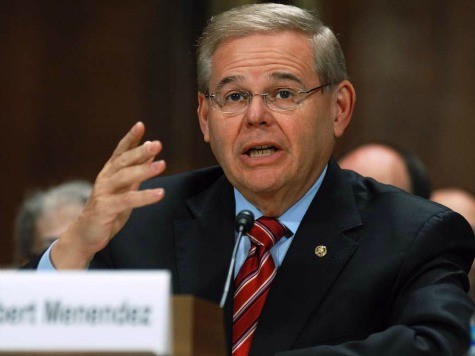
A political appointee of President Barack Obama’s is about to get roped into the brewing scandal surrounding New Jersey Democratic Sen. Bob Menendez and his friend Democratic Party mega-donor ophthalmologist Dr. Salomon Melgen. The man President Obama picked to be his administration’s ambassador to the Dominican Republic appears to have a supporting role in the quid pro quo on the port deal cronyism that has the mainstream media reeling and sparked the New York Times to demand Senate Majority Leader Harry Reid remove Menendez as Chair of the Senate Foreign Relations Committee.
On March 11, 2010, Menendez was acting as the presiding chairman of the powerful Senate committee he now leads, during confirmation hearings for several of President Barack Obama’s diplomatic nominees. One such nominee was Raul Yzaguirre, who Obama named to be his ambassador to the Dominican Republic.
During Menendez’s exchange with Yzaguirre, the New Jersey Democrat pushed the concept of port security in the Dominican Republic.
“I have spent a lot of time in the focus of the Western Hemisphere for my 18 years in Congress, and the Dominican Republic is a country of great opportunity, but also I believe of certain challenges that it has, challenges particularly where it has become the transit point of narcotics through the Dominican Republic on its way to the United State,” Menendez said to the man who would eventually become President Obama’s ambassador to the Dominican Republic.
“In my own state of New Jersey, the megaport of the East Coast, Port of Elizabeth in Newark, sometimes called the Port of New York — has much shipments that come through the Dominican Republic. And I am seriously concerned, having had a series of briefings, about some of the regional security issues that we are concerned of, particularly with the drug flow coming through around and over the Dominican Republic. I am concerned about issues of corruption, and I am concerned about public reports that talk about at what levels that has ultimately affected the government of the Dominican Republic.”
Menendez continued by asking if he could get Yzaguirre’s “sense, whether — I know you’re not there yet — whether you’ve been briefed by the State Department on any of this, and most importantly, can we get your commitment to put this in your portfolio as our ambassador in pursuing these interests which are critical to the United States in terms of our overall counter- narcotics effort?”
Yzaguirre responded in the affirmative.
“You have my wholehearted commitment to do so, Mr. Chairman,” Obama’s nominee promised. “Let me explain that part of the problem we have is — as a result of our success in interdicting the drug traffic to Mexico through the Merida Initiative — and some of the pressure now is being channeled through the Caribbean highlands, particularly the Dominican Republic. And it’s becoming one of the most frequently used route to bring drugs into the United States and other countries in the Western Hemisphere.”
During the 2010 timeframe in which Menendez was managing Yzaguirre’s U.S. Senate confirmation to represent the United States in the Dominican Republic, the senator’s big donor was negotiating to buy into a company that would greatly benefit from a then-stalled port security contract. Melgen was well on his way to securing a 50-percent interest in company ICSSI. According to the New York Times, Melgen opened negotiations for that ICSSI stake as far back as February 2006. He finalized the purchase in August 2011.
ICSSI’s only significant asset is a port security contract, in which the company would provide the Dominican government with X-ray equipment to screen containers in its 12 ports. In addition to the equipment, ICSSI would conduct the screening at the ports. The company would be paid up to $500 million over the ten-year life of the contract. Melgen has a 50% ownership stake in the company.
As the Dominican government changed hands from now former president Leonel Fernandez to current president Danilo Medina, government officials in the island nation tussled over the stalled contract. Meanwhile, Menendez pressured political figures in the U.S. State Department over the summer of 2012 to force the Dominican Republic to act on the contract.
Despite all the pressure, the contract remained stalled in litigation. But shortly after President Obama’s re-election here in the United States, Yzaguirre–whom the Washington Post describes as “an ally of Menendez”–ramped up his own political pressure on the port security deal.
Yzaguirre “added his voice to the cause,” the Post reported, citing local Dominican media.
Then, a November 22, 2012, article in VOXXI–the media company for which Melgen serves as chairman–detailed Yzaguirre’s new promises for port security. The article promoted ICSSI’s contract as the only way to change the “status quo,” which VOXXI said “opens the door to Dominican import companies to avoid paying taxes and paves the way for drug traffickers to operate in a country where the consumption of drugs have increased considerably.”

COMMENTS
Please let us know if you're having issues with commenting.